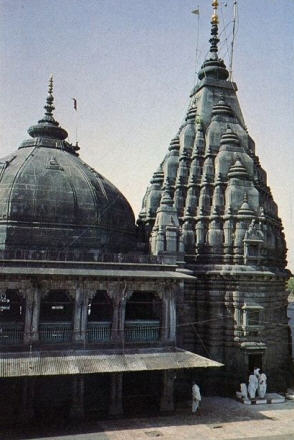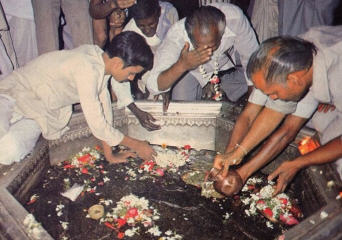A Journey For The Sake Of Our Fathers
Following Vedic tradition, sons come to this special place to worship the Lord,
insuring auspiciousness for their departed fathers.
This is not the place where Buddha attained enlightenment. That's Bodhgaya, about twelve kilometers south.

Visnupada Temple Gaya, Bihar
But Gaya itself, as a place of pilgrimage, has an importance of its own. Pious Hindu sons from all over India come here to make offerings and give prayers for the sake of their father after he has passed away.
The temple here is small and crowded, and at first we see only aimless crowds milling about from chamber to chamber. But gradually we make out the order of things: the temple priests guiding groups of pilgrims from function to function, place to place. Some pilgrims sit beneath thatched shelters by the riverside, chanting mantras. Some offer sandalwood chips into a fire in a temple shrine. And ultimately, on behalf of their fathers, all the pilgrims pour water on the temple's main object of worship, a stone imprint of the lotus feet of Lord Visnu, the Supreme Personality of Godhead.
The idea is this: We all perform both pious and sinful acts, which in the next life (or lives after that) bring both good and bad results. This is the familiar idea of karma you reap what you sow. Pious acts in this life, good results in the next; sinful acts, bad results.
Since most of us are neither entirely pious nor entirely sinful, the fruits we can expect are mixed some bitter, some sweet. The laws of karma take all our acts into account, so even the most pious soul may sometimes get stuck with a bitter dose of fate. And the most bitter is that he may have to suffer as a ghost or be sent to the worlds of hell.
According to Vedic writings, the soul travels life to life from one body to the next. Sometimes I may be born into a wealthy family, sometimes a poor one, sometimes heavenly circumstances, sometimes hellish. And sometimes, caught in a sort of twisted karmic loop, I may be denied any body at all. It is then that I must live as a ghost a disembodied spirit.
This is far from liberation. A liberated soul is free from all material desires, so he's also freed forever from material existence. But the disembodied soul the ghost is still bound by material desires. He's frustrated, however, because he has no body with which to fulfill them. While other souls make progress, the ghost may hang stranded in his twisted loop for many generations.
Or consider the hellish worlds. Even some places on earth are so miserable, so wretched, that we speak of them as hellish. Similarly, the Vedic writings tell of entire planets where pain and suffering prevail. These are the worlds of hell.
In the Vedic conception, hell is not eternal. Just as on earth one may have to live for many years in poverty or disease, one may have to suffer for thousands of years in hell. A pious son, therefore, to save his father from the possibility of hellish or ghostly life, goes to worship Lord Visnu at Gaya.
Visnu, or Krsna, the Supreme Lord, is supremely pure. He alone awards liberation from all material miseries. When a pious son makes an offering to Lord Visnu and then by ritual and meditation gives the remnants of that offering to his departed father, the father is purified of sins, and if he is suffering from ghostly or hellish life, he is released.
To perform this offering is the traditional Vedic duty of a son. A pious son, therefore, is called putra, or "one who can deliver his father from hell."
Dipping in the waters of the Phalgu River outside the temple, I naturally think of my own father, the memory dimmed by nearly twenty years, yet persisting nonetheless. And as other pilgrims bob in the water around me, it strikes me that each must also be thinking of his father. We're afloat in the river full of thoughts and affections flowing back over generations.
Generations have come here before us our fathers thinking of theirs. And if we're Krsna conscious our thoughts flow back not only to our father, grandfather, or great-grandfather but all the way back to the original father, Krsna. As all rivers have a source, the source of all generations is the original person, Krsna, worshiped here in Gaya as Lord Visnu.

By coincidence we're here in Gaya on the appearance day of Lord Nrsimhadeva, Lord Visnu's incarnation as half lion, half man. Nrsimhadeva came to protect the great devotee Prahlada Maharaja, a five-year-old boy, and to kill Prahlada's demonic father, Hiranyakasipu. This is a long history, but the point that concerns us here is that after saving Prahlada from the tortures of his demonic father, Lord Nrsimhadeva offered Prahlada any benediction he might ask.
"My dear Lord," Prahlada said, "I don't want to do business with You, like a merchant. I just want to serve You, You don't have to offer me any benediction."
But when the Lord insisted, Prahlada replied, "All right. My father was demonic, so You have killed him. Now please give him liberation from the cycle of birth and death."
Lord Nrsimhadeva, however, told Prahlada that such a request was unnecessary. "Because you are My pure devotee," He said, "ten generations of your forefathers and ten generations of your descendants will automatically be liberated."
This is a kind of extra inducement from the Lord. Krsna says, "Give up all other duties and surrender to Me." But we may think, "If I surrender, then what about my mother and father and my family duties?" So Krsna gives a special promise: "Just surrender to Me, and your family will get the highest benefit."
A Krsna conscious person knows that ties in bodily relationships whether father and son, brother and sister, or whatever have no lasting meaning, because the body itself never lasts. The soul travels from lifetime to lifetime, body to body, and only for the stretch between one birth and the death that follows do we think of a particular family as "mine."
Still, a devotee has sympathy and affection for all living beings. This naturally includes those whose karma has in this life cast them in the role of his father and mother and friends.
But affection for friends and relatives shouldn't stand in the way of spiritual advancement. If we're trying to get to the root of all existence and this is the real goal of human life we shouldn't let ourselves get lost in the branches of a family tree.
Spiritual life means finding the root of everything. The Bhagavad-gita says that after many lifetimes of searching, we at last find that this root is Visnu, Lord Sri Krsna, the Personality of Godhead. It is then that we surrender to Him, saying, "Krsna is everything!"
As by watering a root we automatically give water to the leaves and branches, by serving Krsna we give the best service to all living beings, including all the branches and twigs of our family tree.
A devotee of Krsna, therefore, is the best kind of son. He not only journeys once to Gaya to pour water on the footprints of Lord Visnu, but he gives full devotion to the feet of the Lord in all the activities of his life.
